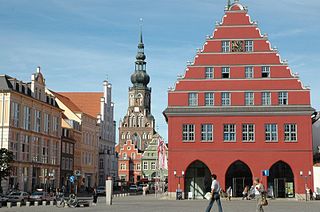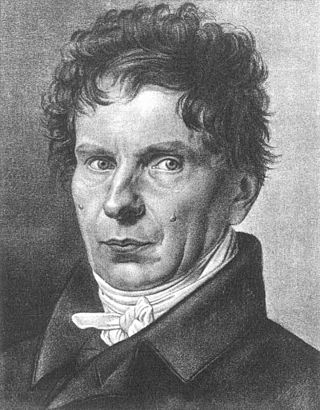Related Research Articles

Pomerania is a historical region on the southern shore of the Baltic Sea in Central Europe, split between Poland and Germany. The central and eastern part belongs to the West Pomeranian, Pomeranian and Kuyavian-Pomeranian voivodeships of Poland, while the western part belongs to the German states of Mecklenburg-Western Pomerania and Brandenburg.

Stralsund, officially the Hanseatic City of Stralsund, is the fifth-largest city in the northeastern German federal state of Mecklenburg-Western Pomerania after Rostock, Schwerin, Neubrandenburg and Greifswald, and the second-largest city in the Pomeranian part of the state. It is located on the southern coast of the Strelasund, a sound of the Baltic Sea separating the island of Rügen from the Pomeranian mainland.

Greifswald, officially the University and Hanseatic City of Greifswald is the fourth-largest city in the German state of Mecklenburg-Western Pomerania after Rostock, Schwerin and Neubrandenburg. In 2021 it surpassed Stralsund for the first time, and became the largest city in the Pomeranian part of the state. It sits on the River Ryck, at its mouth into the Danish Wiek, a sub-bay of the Bay of Greifswald, which is itself a sub-bay of the Bay of Pomerania of the Baltic Sea.

Swedish Pomerania was a dominion under the Swedish Crown from 1630 to 1815 on what is now the Baltic coast of Germany and Poland. Following the Polish War and the Thirty Years' War, Sweden held extensive control over the lands on the southern Baltic coast, including Pomerania and parts of Livonia and Prussia.
Franz Reinhold Schwede was a Nazi German politician, Oberbürgermeister of Coburg and both Gauleiter and Oberpräsident of Pomerania. An early supporter of Adolf Hitler in Coburg, Schwede used intimidation and propaganda to help elect the first Nazi-majority local government in Germany. This contributed to a personality cult surrounding Schwede and he became known as "Franz Schwede-Coburg." During World War II he ordered secret executions of the infirm and mass deportations of Jews. He also played a key role in abandoning the Pomeranian civilian population to the advancing Red Army, while escaping their fate himself. In 1945 he was captured by the British Army and in 1948 he was tried and convicted of war crimes.

The Province of Pomerania was a province of Prussia from 1815 to 1945. Pomerania was established as a province of the Kingdom of Prussia in 1815, an expansion of the older Brandenburg-Prussia province of Pomerania, and then became part of the German Empire in 1871. From 1918, Pomerania was a province of the Free State of Prussia until it was dissolved following World War II by decree of the Allied Control Council with the de jure abolition of Prussia on 25 February 1947, and its territory divided between Poland and Allied-occupied Germany. The city of Stettin was the provincial capital.

The Pomeranian State Museum in Greifswald, Western Pomerania, is a public museum primarily dedicated to Pomeranian history and arts. The largest exhibitions show archeological findings and artefacts from the Pomerania region and paintings, e.g. of Caspar David Friedrich, a Greifswald local, such as Ruins of Eldena Abbey in the Riesengebirge. The museum was established in the years of 1998 to 2005 at the site of the historical Franziskaner abbey.

History of Pomerania (1806–1933) covers the history of Pomerania from the early 19th century until the rise of Nazi Germany.

Philipp Julius was duke of Pomerania in the Teilherzogtum Pomerania-Wolgast from 1592 to 1625.

The capitulation of Franzburg was a treaty providing for the capitulation of the Duchy of Pomerania to the forces of the Holy Roman Empire during the Thirty Years' War. It was signed on 10 November (O.S.) or 20 November (N.S.) 1627 by Bogislaw XIV, Duke of Pomerania and Hans Georg von Arnim, commander in chief of an occupation force belonging to the army of Ferdinand II, Holy Roman Emperor, led by Albrecht von Wallenstein. While the terms of the capitulation were unfavourable for the Duchy of Pomerania already, occupation became even more burdensome when the occupation force did not adhere to the restrictions outlined in Franzburg. Stralsund resisted with Danish, Swedish and Scottish support, another Danish intervention failed. Imperial occupation lasted until Swedish forces invaded in 1630, and subsequently cleared all of the Duchy of Pomerania of imperial forces until 1631.

FältmarskalkCarl Gustaf Wrangel was a Swedish statesman and military commander who commanded the Swedish forces in the Thirty Years' War, as well as the Torstenson, Bremen, Second Northern and Scanian Wars.
Degener Buggenhagen, also spelled Degner Buggenhagen was a German nobleman and Hereditary Lord Marshal of the Duchy of Pomerania-Wolgast.

The Region of Stralsund belonged to the Prussian Province of Pomerania and existed from 1818 to 1932.
The All Saints Day flood of 1304 was a storm surge that hit the southwestern Baltic Sea coast on 1 November that year. The region of Western Pomerania was particularly badly affected by the flooding. 271 people died as a result of the flood. The dating of the disaster to All Saints' Day in 1304, which gave the flood its name, goes back to the Stralsundische Chronik by Johann Berckmann. This date is, however, not confirmed, although it is probable that the year was 1304.
Christian Thomsen Carl, Christian Thomasen Carl, Christian Thomæsen Carl, Christian Thomesen Carl, Christen Thomasen Carl or Christen Thomesen Carl, in German tradition Carlson or Karlson, rarely Carlsen was a Danish naval officer. He is known not only for his military career, but also for saving the town council's archives in Greifswald as well as the whole town of Anklam from being burned during the Great Northern War.

Bartholomäus Sastrow, sometimes anglicised Bartholomew, was a German official, notary, and mayor of Stralsund. He left a culturally and historically important autobiography, written in 1595 when he was 75 years of age. There is a plaque marking the site of his birth at Lange Straße 54 in Greifswald.
Erich Gülzow was a German local historian, philologist and publisher. He wrote books on the history of Vorpommern and Rügen island. Through his publications on Ernst Moritz Arndt he became known beyond the borders of Pomerania.
Balzer Peter Vahl was burgomaster of Greifswald. He founded the Greifswald merchant family Wahl.

Wilhelm Titel was a German painter and academic drawing teacher at the University of Greifswald.

Adolf Friedrich von Olthof was a Swedish Pomeranian councilor, and patron of the arts.
References
- ↑ "Porträtsammlung Stralsunder Bürgermeister und Ratsherren bekommt Zuwachs"
- ↑ "Schwing, Carl Georg"
- ↑ Theodor Wengler: Der Provinzialverband Pommern. Verzeichnis der Mitglieder des Provinziallandtages. Veröffentlichungen der Historischen Kommission für Pommern, Reihe V, Band 44. Böhlau Verlag, Köln Weimar Wien 2008, ISBN 978-3-412-20109-8, S. 12–32.
- ↑ "Stralsund erhält Bürgermeister-Porträt"
- ↑ "Amtliche liste der schiffe der deutschen kriegs und handelsmarine mit ihren unterscheidungssignalen, als anhang zum Internationalen signalbuch"